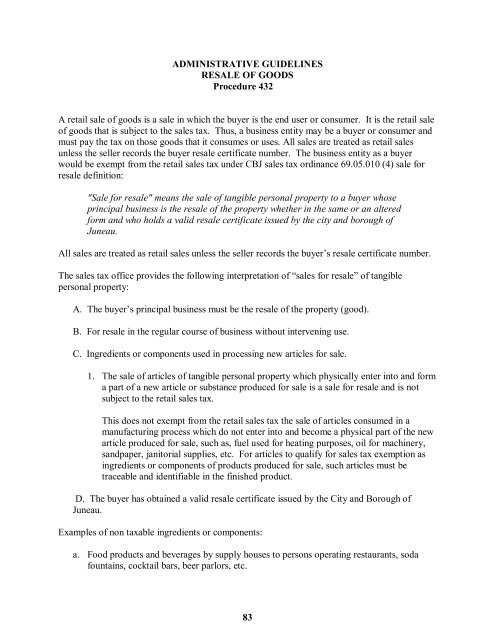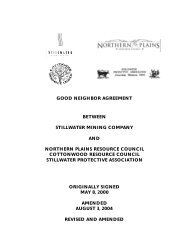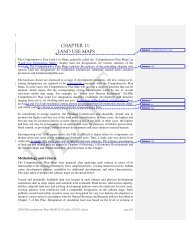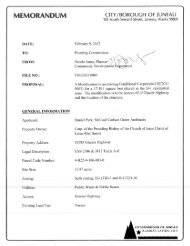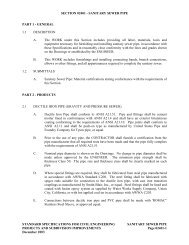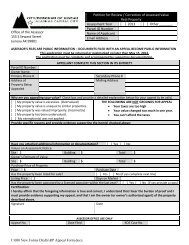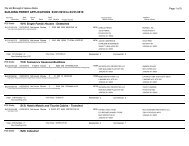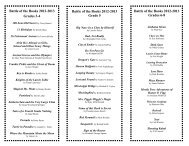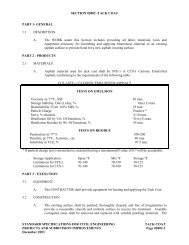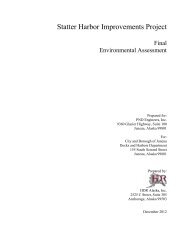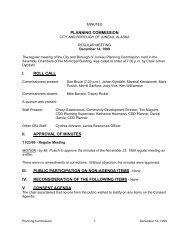432. Sales for Resale - Goods - City and Borough of Juneau
432. Sales for Resale - Goods - City and Borough of Juneau
432. Sales for Resale - Goods - City and Borough of Juneau
Create successful ePaper yourself
Turn your PDF publications into a flip-book with our unique Google optimized e-Paper software.
ADMINISTRATIVE GUIDELINES<br />
RESALE OF GOODS<br />
Procedure 432<br />
A retail sale <strong>of</strong> goods is a sale in which the buyer is the end user or consumer. It is the retail sale<br />
<strong>of</strong> goods that is subject to the sales tax. Thus, a business entity may be a buyer or consumer <strong>and</strong><br />
must pay the tax on those goods that it consumes or uses. All sales are treated as retail sales<br />
unless the seller records the buyer resale certificate number. The business entity as a buyer<br />
would be exempt from the retail sales tax under CBJ sales tax ordinance 69.05.010 (4) sale <strong>for</strong><br />
resale definition:<br />
"Sale <strong>for</strong> resale" means the sale <strong>of</strong> tangible personal property to a buyer whose<br />
principal business is the resale <strong>of</strong> the property whether in the same or an altered<br />
<strong>for</strong>m <strong>and</strong> who holds a valid resale certificate issued by the city <strong>and</strong> borough <strong>of</strong><br />
<strong>Juneau</strong>.<br />
All sales are treated as retail sales unless the seller records the buyer’s resale certificate number.<br />
The sales tax <strong>of</strong>fice provides the following interpretation <strong>of</strong> “sales <strong>for</strong> resale” <strong>of</strong> tangible<br />
personal property:<br />
A. The buyer’s principal business must be the resale <strong>of</strong> the property (good).<br />
B. For resale in the regular course <strong>of</strong> business without intervening use.<br />
C. Ingredients or components used in processing new articles <strong>for</strong> sale.<br />
1. The sale <strong>of</strong> articles <strong>of</strong> tangible personal property which physically enter into <strong>and</strong> <strong>for</strong>m<br />
a part <strong>of</strong> a new article or substance produced <strong>for</strong> sale is a sale <strong>for</strong> resale <strong>and</strong> is not<br />
subject to the retail sales tax.<br />
This does not exempt from the retail sales tax the sale <strong>of</strong> articles consumed in a<br />
manufacturing process which do not enter into <strong>and</strong> become a physical part <strong>of</strong> the new<br />
article produced <strong>for</strong> sale, such as, fuel used <strong>for</strong> heating purposes, oil <strong>for</strong> machinery,<br />
s<strong>and</strong>paper, janitorial supplies, etc. For articles to qualify <strong>for</strong> sales tax exemption as<br />
ingredients or components <strong>of</strong> products produced <strong>for</strong> sale, such articles must be<br />
traceable <strong>and</strong> identifiable in the finished product.<br />
D. The buyer has obtained a valid resale certificate issued by the <strong>City</strong> <strong>and</strong> <strong>Borough</strong> <strong>of</strong><br />
<strong>Juneau</strong>.<br />
Examples <strong>of</strong> non taxable ingredients or components:<br />
a. Food products <strong>and</strong> beverages by supply houses to persons operating restaurants, soda<br />
fountains, cocktail bars, beer parlors, etc.<br />
83
. Food containers or wrap <strong>and</strong> other disposable articles which are:<br />
1. furnished to retail customers;<br />
2. essential to the serving <strong>of</strong> the food or beverage <strong>and</strong> without which the food or<br />
beverage could not be served.<br />
Note: Java Jackets or the protective sleeve placed on hot drink containers are not essential<br />
to the serving <strong>of</strong> the drink <strong>and</strong> there<strong>for</strong>e are subject to the sales tax.<br />
The following lists are provided <strong>for</strong> assistance in determining non taxable items. This list is not<br />
meant to be allinclusive.<br />
lids <strong>and</strong> straws<br />
portion bags<br />
sized serving tissues <strong>and</strong> wax paper<br />
boxes <strong>for</strong> pizza, cake, doughnuts<br />
napkins, individually<br />
paper <strong>and</strong> plastic plates <strong>and</strong> cups<br />
paper bags<br />
individual portion cups<br />
disposable food trays <strong>and</strong> containers<br />
disposable eating utensils<br />
The sale <strong>of</strong> articles consumed in a manufacturing process which do not enter into <strong>and</strong> become a<br />
physical part <strong>of</strong> the new article or substance produced <strong>for</strong> sale is a retail sale <strong>and</strong> as such is<br />
taxable to the buyer.<br />
Examples <strong>of</strong> taxable components:<br />
a. Fuel used to operate equipment used in manufacturing or processing;<br />
b. S<strong>and</strong>paper, solvents used <strong>for</strong> cleaning, visqueen used <strong>for</strong> coverings <strong>and</strong> discarded, <strong>for</strong>m<br />
lumber;<br />
c. Chemicals which are used up, dissolve in the process;<br />
d. Dishes, kitchen utensils, linens, etc. purchased by restaurants, cocktail bars, <strong>and</strong> similar<br />
businesses;<br />
e. Equipment, repairs, appliances; <strong>and</strong><br />
f. Tools, equipment rentals without an operator.<br />
<strong>Sales</strong> <strong>of</strong> containers to persons who sell tangible personal property therein, but who retain title to<br />
such containers which are to be returned, are sales <strong>for</strong> consumption. The retail sales tax must be<br />
paid upon the sale or use there<strong>of</strong>. This class includes wooden or metal bottle cases, barrels, gas<br />
tanks, carboys, drums, bags <strong>and</strong> other items, when title thereto remains in the seller <strong>of</strong> the<br />
tangible personal property contained therein, <strong>and</strong> even though a deposit is not made <strong>for</strong> the<br />
containers, <strong>and</strong> when such articles are customarily returned to him. If a charge is made against a<br />
customer <strong>for</strong> the container, with the underst<strong>and</strong>ing that such charge will be canceled or rebated<br />
84
when the container is returned, the amount charged is deemed to be made as security <strong>for</strong> the<br />
return <strong>of</strong> the container <strong>and</strong> is not part <strong>of</strong> the selling price <strong>for</strong> tax purposes.<br />
<strong>Sales</strong> <strong>of</strong> packing materials to persons engaged in the business <strong>of</strong> custom or commercial packing<br />
are sales <strong>for</strong> consumption <strong>and</strong> are subject to the retail sales tax.<br />
In special cases where doubt exists, a special ruling will be made by the sales tax <strong>of</strong>fice upon<br />
submission <strong>of</strong> all pertinent facts relative to the nature <strong>of</strong> the ingredients, components <strong>and</strong><br />
chemicals involved.<br />
<strong>Resale</strong> Documentation<br />
Responsibility <strong>of</strong> the Seller:<br />
All sales are treated as retail sales <strong>of</strong> goods unless the seller records the buyer’s resale <strong>of</strong> goods<br />
certificate number. When the seller accepts from the buyer a properly executed resale <strong>of</strong> goods<br />
certificate at the time <strong>of</strong> sale, or has one on file at the time <strong>of</strong> sale, the seller is relieved <strong>of</strong><br />
liability <strong>for</strong> retail sales tax with respect to the transaction. The seller is obligated to accept the<br />
resale <strong>of</strong> goods certificate in good faith, i.e., the seller cannot accept a resale <strong>of</strong> goods certificate<br />
if he knows the property will not be resold. When a seller has not secured a properly executed<br />
resale <strong>of</strong> goods certificate number, they are personally liable <strong>for</strong> the tax due.<br />
Responsibility <strong>of</strong> Buyer:<br />
Depending on the business entity, the resale <strong>of</strong> goods certificate may authorize the buyer to<br />
purchase at wholesale all products or only selected products. The buyer will be held responsible<br />
<strong>for</strong> separating taxable items from nontaxable items at the time <strong>of</strong> purchase. The resale <strong>of</strong> goods<br />
certificate may be limited to a single sales transaction, or may apply to all sales transactions<br />
within the one year period. The buyer is responsible <strong>for</strong> educating all persons authorized to use<br />
the resale <strong>of</strong> goods certificate on the proper use <strong>of</strong> the buyer’s resale certificate privileges.<br />
Whatever its <strong>for</strong>m <strong>and</strong>/or purpose, the resale <strong>of</strong> goods certificate must be presented by the buyer<br />
to the seller, <strong>and</strong> the person who is authorized to make the representation on behalf <strong>of</strong> the buyer<br />
must sign the sales invoice or the seller’s record <strong>of</strong> exempt sales documentation.<br />
Purchases <strong>for</strong> Dual Purposes<br />
Many times a business will withdraw items purchased <strong>for</strong> resale from inventory <strong>for</strong> its own use.<br />
Such businesses are making purchases <strong>for</strong> dual purposes. When an item purchased <strong>for</strong> resale is<br />
sold at retail, the retail customer becomes the end user or consumer <strong>and</strong> must pay tax on that<br />
purchase. Similarly, when a business withdraws an item previously purchased <strong>for</strong> resale from<br />
inventory <strong>for</strong> consumption, a retail sale is deemed to have taken place. The business becomes<br />
the end user or consumer <strong>of</strong> the item, <strong>and</strong> must pay the tax on that purchase. The business must<br />
include such sales in their reported gross sales. The value to be placed upon such sales is the<br />
price at which these goods are <strong>of</strong>fered <strong>for</strong> sale by the business withdrawing them. All cash or<br />
other customary discounts which the business would ordinarily allow to its customers may be<br />
85
deducted; however, in no event can the amount used be less than the amount paid <strong>for</strong> the goods<br />
by the business making the withdrawal.<br />
Businesses making purchases <strong>for</strong> dual purposes may use the resale certificate to purchase<br />
products <strong>for</strong> their inventory from a supplier. The supplier is liable <strong>for</strong> the sales tax <strong>and</strong> has the<br />
burden <strong>of</strong> pro<strong>of</strong> that the sale was not at retail. However, if the purchaser gives the supplier a<br />
valid resale certificate, the supplier is relieved <strong>of</strong> the burden <strong>of</strong> pro<strong>of</strong> <strong>and</strong> the liability <strong>of</strong> the tax<br />
shifts to the purchaser. The purchaser must then report all goods consumed from inventory in<br />
gross sales.<br />
Purchases by Independent Contractors<br />
Many companies make retail sales through independent contractors. An independent contractor<br />
may use a resale <strong>of</strong> goods certificate to purchase inventory taxexempt <strong>for</strong> resale from the<br />
company; the sales tax is then due on the independent contractor’s retail sales. In addition to<br />
retail sales to the public, independent contractors must collect the sales tax on all sales they make<br />
to themselves as individuals. These transactions are considered sales between two parties (the<br />
independent contractor <strong>and</strong> an individual), <strong>and</strong> tax is due on such transactions. For example, an<br />
individual contracts with a directmarketing cosmetic company as its agent. If the individual<br />
purchases cosmetics from her own inventory, she must include her cost, or her business’s selling<br />
price to her, <strong>for</strong> the cosmetics in the gross sales on her business’s CBJ sales tax return <strong>and</strong> remit<br />
the appropriate amount <strong>of</strong> tax due with the return.<br />
Improper use <strong>of</strong> resale <strong>of</strong> goods certificates or exemptions may result in revocation <strong>of</strong> the<br />
exemption under 69.05.052, or criminal liability under 69.05.110.<br />
<strong>Resale</strong> certificates may only be used <strong>for</strong> sales at wholesale <strong>and</strong> may not be used as pro<strong>of</strong> <strong>of</strong><br />
entitlement to other retail sales tax exemptions provided by 69.05.040.<br />
CBJ 69.05.010 (4)<br />
CBJ 69.05.040 (32)<br />
86


